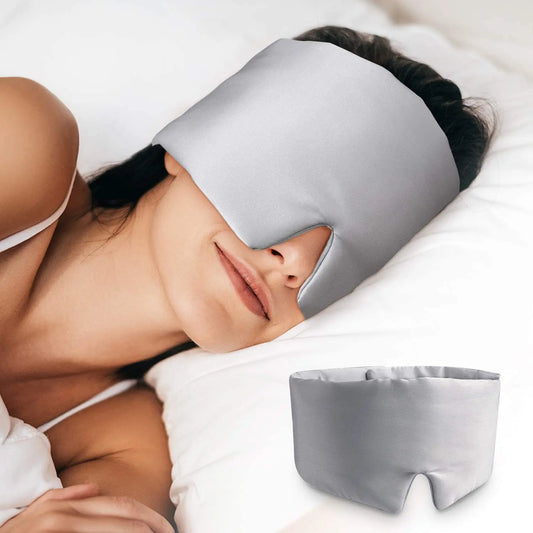
4 Daily Habits that keep you Awake at Night
Share
If you’ve ever found yourself tossing and turning, staring at the ceiling, or scrolling on your phone at 2 a.m., you’re not alone. Trouble sleeping is one of the most common health concerns today, affecting millions of people worldwide. While occasional sleepless nights can happen to anyone, chronic insomnia or poor sleep often comes down to lifestyle choices we don’t even realise are sabotaging our rest.
The good news? With the right adjustments, you can break free from these patterns and learn how to sleep better naturally. In this article, we’ll explore four daily habits that keep you awake at night—and most importantly, how to fix them. Along the way, we’ll share practical sleep tips and natural solutions, including a few gentle aids like calming teas, sleep masks, and pillow sprays that can help you wind down with ease.
Habit 1: Too Much Screen Time Before Bed
We live in a digital world, but when it comes to sleep, screens are one of the biggest culprits. Whether it’s scrolling through social media, catching up on emails, or binge-watching your favourite show, screen time before bed can significantly interfere with sleep.
The reason? Blue light disrupts melatonin, the hormone that signals to your body that it’s time to rest. Exposure to blue light in the evening can delay your circadian rhythm, making it harder to fall asleep and stay asleep.
How to Fix It:
- Set a digital sunset: Aim to turn off screens at least an hour before bedtime.
- Use night mode or blue light filters: These can reduce the impact if you must use your devices.
- Replace screens with calming activities: Try reading a physical book, listening to soft music, or practicing gentle stretches.
To make your transition easier, consider pairing these changes with natural wind-down aids. An eye mask can block out residual light, while a lavender pillow spray helps create a calming environment that tells your brain it’s time to rest.
Habit 2: Late Caffeine and Stimulant Intake
A cup of coffee in the morning might give you the boost you need, but drinking caffeine too late in the day can lead to trouble sleeping at night. Caffeine has a half-life of about 6–8 hours, meaning it stays active in your system long after your afternoon latte. Not only can it delay sleep onset, but it can also reduce the amount of deep, restorative sleep you get.
How to Fix It:
- Avoid caffeine after mid-afternoon: As a rule of thumb, try to stop drinking coffee, energy drinks, or strong teas after 2 p.m.
- Switch to herbal alternatives: Calming teas such as chamomile, valerian root, or lemon balm can promote relaxation without the jitters.
- Stay hydrated with water or decaf options: This prevents thirst from disrupting your sleep later on.
If you love having a warm drink in the evening, consider a caffeine-free herbal tea, which are specially blended to encourage relaxation and better sleep.
Habit 3: Inconsistent Sleep Schedule
Your body thrives on rhythm. An inconsistent sleep schedule—going to bed at 11 p.m. one night and 2 a.m. the next—confuses your circadian rhythm, making it harder to fall asleep naturally. Over time, this irregularity can contribute to trouble sleeping, daytime fatigue, and even mood imbalances.
How to Fix It:
- Set consistent bed and wake times: Even on weekends, aim to keep your schedule within an hour’s range.
- Create a bedtime routine: Doing the same relaxing activities before bed signals to your body that it’s time to wind down.
- Track your sleep habits: A sleep journal can help you identify patterns and triggers that may be disrupting your rest.
If you struggle with consistency, start small—commit to a steady wake-up time first, and bedtime will naturally adjust. To support your new routine, try incorporating relaxation products such as aromatherapy sprays or calming aids that reinforce the sense of winding down. A sunrise simulation alarm clock fills your room with warm red light, which supports melatonin production.
Habit 4: Stress and Overthinking at Night
You’ve turned off the lights, but your brain has other plans—running through tomorrow’s to-do list, replaying conversations, or worrying about what you didn’t finish today. Stress and overthinking keep your nervous system in “alert mode,” making it incredibly difficult to relax into sleep.
How to Fix It:
- Journaling: Write down your thoughts before bed to clear your mind.
- Deep breathing or meditation: These techniques activate the body’s relaxation response.
- Gentle yoga or stretching: Helps release built-up tension in the body.
- Comfort aids: A weighted blanket calms both the mind and body through deep pressure which is shown to increase serotonin and melatonin production.
Developing a nightly ritual to manage stress can make a huge difference. By intentionally slowing down and signaling to your body that the day is over, you’ll find it much easier to drift off peacefully.
Conclusion
The truth is, you don’t have to overhaul your entire life to improve your sleep. Often, it’s the small daily habits that matter most. By reducing screen time, cutting off caffeine earlier, sticking to a consistent schedule, and managing stress before bed, you’ll set yourself up for deeper, more restorative rest.
Remember—lasting change comes from consistency. Start with just one or two of these tips, and you’ll likely notice improvements within a few weeks.
And if you’d like a little extra help creating a calming bedtime routine, we invite you to explore our range of natural sleep aids. With the right tools and habits, peaceful nights are within your reach.








